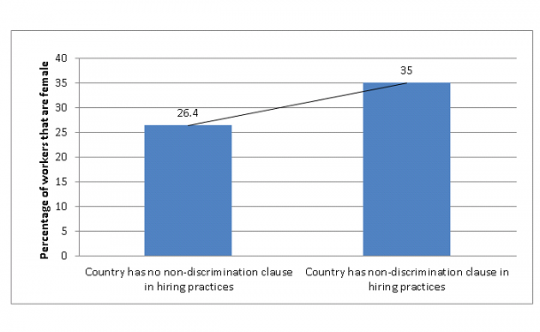Women’s employment in the private sector generally lags behind that of men. This disparity has gained much attention given the potential equity and efficiency gains that can be achieved with higher women labor force participation. There are competing theories as to why this could be the case. One theory is that women have preferences that voluntarily exclude them from the labor market. Another is that women may be less mobile than male workers, and thus are underrepresented in the labor market. Finally, there may be a poor match between available jobs and women job applicants. If none of these mechanisms fully explain the gender disparity in the labor market, one can consider the possibility that gender discrimination may exist.
Can mandating a non-discrimination clause in hiring practices along gender lines improve female employment? That depends on two main factors. First, if alternate theories other than discrimination explain the gender disparity in labor market participation, then there should be no relationship between gender-specific hiring laws and women’s employment. Second, if enforcement of non-discrimination laws is non-existent, or difficult to execute in developing economies, there should be no relationship in this case as well. However, if gender discrimination in the labor market does exist and the presence of a non-discrimination law can be enforced, the policy implications are rather sharp and the benefits may be sizeable.
My co-author and I explore the relationship between the presence of a non-discrimination clause in hiring practices along gender lines and women’s employment in developing countries in a study (forthcoming, Feminist Economics) using two well-known data sources - employment data from Enterprise Surveys and a database of gender related laws collected by Women, Business and the Law. Two conditions have to be met for a country to have the non-discrimination clause included in the data from the Women, Business and the Law database: (a) the clause has to explicitly mention the word sex or gender; (b) the clause has to explicitly refer to the hiring process and not just discrimination in general, and not just discrimination in the workplace once employment is already obtained. Our sample consists of 58 developing economies. We control for several macro-economic factors and firm-specific factors from the Enterprise Surveys data that may influence the level female employment. This includes firm size, sector, female ownership, business environment quality, level of development, education, proportion of women in parliament, and also an overall measure of gender disparity in laws in case we are capturing the effects of other laws.
What do we find? A simple comparison between countries with and without a hiring discrimination shows that the 35 percent of workers are women in the former and 26.4 percent in the latter (figure 1). In a more detailed analysis, where we account for several factors mentioned above, we find that mandating a non-discrimination clause is associated with an increase of 5 percentage points in women’s employment .We also find that this positive association is much stronger among the relatively richer countries, smaller firms and countries that have a larger proportion of women in their total population.
Figure 1

In conclusion, we do find a positive relationship between developing countries with a hiring non-discrimination along gender lines and women’s employment. We do caution that data limitations prevent us from claiming with certainty a causal relationship, but the findings do warrant more research into the role that institutions and laws play in shaping gender equality in the private sector in developing nations. We hope our finding will encourage future research in the area.
Can mandating a non-discrimination clause in hiring practices along gender lines improve female employment? That depends on two main factors. First, if alternate theories other than discrimination explain the gender disparity in labor market participation, then there should be no relationship between gender-specific hiring laws and women’s employment. Second, if enforcement of non-discrimination laws is non-existent, or difficult to execute in developing economies, there should be no relationship in this case as well. However, if gender discrimination in the labor market does exist and the presence of a non-discrimination law can be enforced, the policy implications are rather sharp and the benefits may be sizeable.
My co-author and I explore the relationship between the presence of a non-discrimination clause in hiring practices along gender lines and women’s employment in developing countries in a study (forthcoming, Feminist Economics) using two well-known data sources - employment data from Enterprise Surveys and a database of gender related laws collected by Women, Business and the Law. Two conditions have to be met for a country to have the non-discrimination clause included in the data from the Women, Business and the Law database: (a) the clause has to explicitly mention the word sex or gender; (b) the clause has to explicitly refer to the hiring process and not just discrimination in general, and not just discrimination in the workplace once employment is already obtained. Our sample consists of 58 developing economies. We control for several macro-economic factors and firm-specific factors from the Enterprise Surveys data that may influence the level female employment. This includes firm size, sector, female ownership, business environment quality, level of development, education, proportion of women in parliament, and also an overall measure of gender disparity in laws in case we are capturing the effects of other laws.
What do we find? A simple comparison between countries with and without a hiring discrimination shows that the 35 percent of workers are women in the former and 26.4 percent in the latter (figure 1). In a more detailed analysis, where we account for several factors mentioned above, we find that mandating a non-discrimination clause is associated with an increase of 5 percentage points in women’s employment .We also find that this positive association is much stronger among the relatively richer countries, smaller firms and countries that have a larger proportion of women in their total population.
Figure 1

In conclusion, we do find a positive relationship between developing countries with a hiring non-discrimination along gender lines and women’s employment. We do caution that data limitations prevent us from claiming with certainty a causal relationship, but the findings do warrant more research into the role that institutions and laws play in shaping gender equality in the private sector in developing nations. We hope our finding will encourage future research in the area.



Join the Conversation